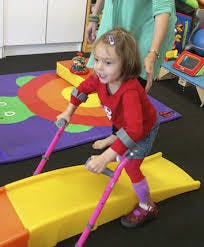

Cerebral Palsy is a movement disorder usually diagnosed in early childhood. READ MORE Cerebral Palsy Cerebral Palsy affects brain development. Its many known causes and risk factors include infections to the pregnant mother or the infant, fetal stroke or bleeding in the developing brain, traumatic brain injury, and genetic mutations.
Signs and Symptoms There are a variety of symptoms and a wide range in the severity of cerebral palsy. Some symptoms that can be addressed with physical therapy are:
- Hemiparesis or muscle weakness on either side of the body
- Abnormal muscle tone such as hypertonicity (rigidity) or hypotonicity (floppiness)
- Poor balance
- Postural dysfunction
- Impaired muscle coordination
- Gross motor delays — difficulty sitting, crawling, walking

Some other common signs and symptoms include difficulty swallowing, learning disabilities, tremors or writhing movements, seizures, hearing or vision problems. Physical Therapy Although cerebral palsy is not a progressive disorder, its effect on the musculoskeletal system can cause worsening symptoms if left untreated. Physical therapy stretching and range of motion exercises help prevent permanent limitations of joint mobility, called contractures, which may be caused by spastic muscles with increased muscle tone. Physical therapists help patients improve balance and coordination by providing individualized, age-appropriate training. Physical therapists also help with posture re-education, overall strengthening, and gait training to help people with cerebral palsy move more efficiently and with fewer aches and pains. Physical therapists also help people with cerebral palsy effectively use assistive devices such as orthotics, walkers, wheel chairs, and other devices needed for activities of daily living. At Back in Motion Physical Therapy, we work closely with speech therapists, occupational therapists, and physicians, for cohesive care of children with cerebral palsy. Call us at (703) 372-5716 to schedule your evaluation.
